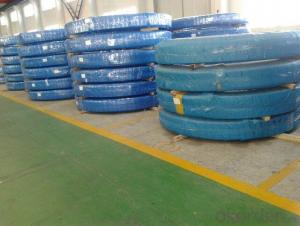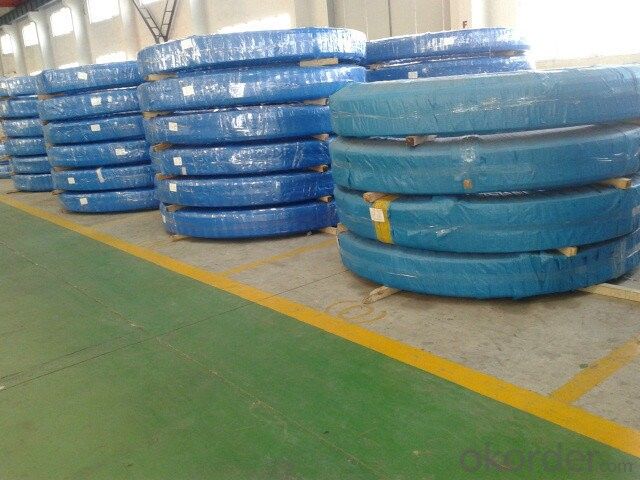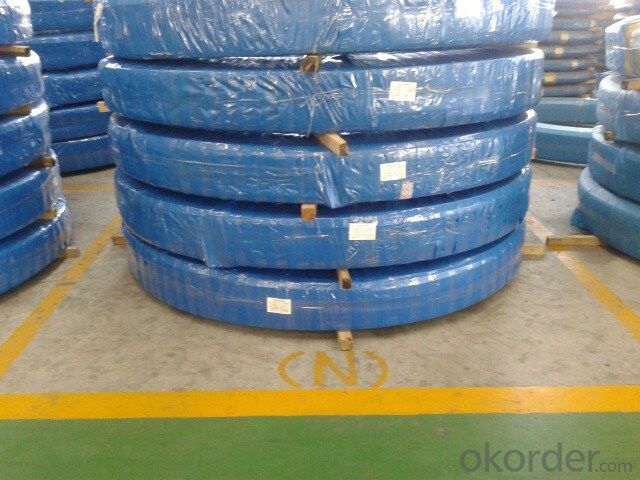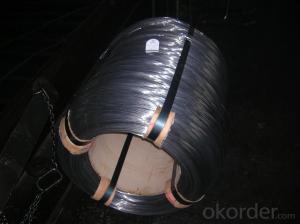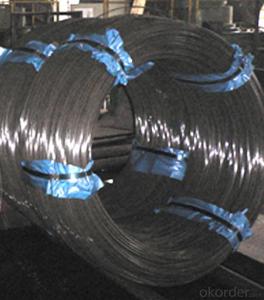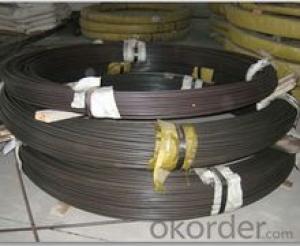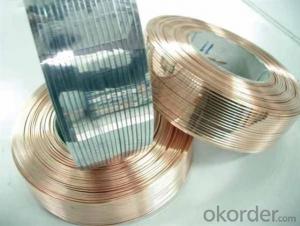OIL TEMPERED SPRING STEEL WIRE
- Loading Port:
- China Main Port
- Payment Terms:
- TT OR LC
- Min Order Qty:
- -
- Supply Capability:
- -
OKorder Service Pledge
OKorder Financial Service
You Might Also Like
Steel grade should be 55CrSi,50CrVA,55Cr3,60Si2Mn,SAE9254.Size range from 1.6mm to 17.0mm,coil weight can be reach 2000kgs.mainly produced into AUTO springs.now export to INDIA,IRAN,SAUDI ARABIA and so on.
We can satisfying market demands constantly and empoldering new product;can offering wires according to German standards(DIN17223/1,DIN17223/2),American standards(ASTM A227/A227M,ASTM A228/228M,ASTM 231/A231M,ASTM A401/401M),Japanese standards(JIS G3521,JIS G3522,JIS G3560,JIS G3561).and European standards(DIN EN10270-1,DIN10270-2)and so on.
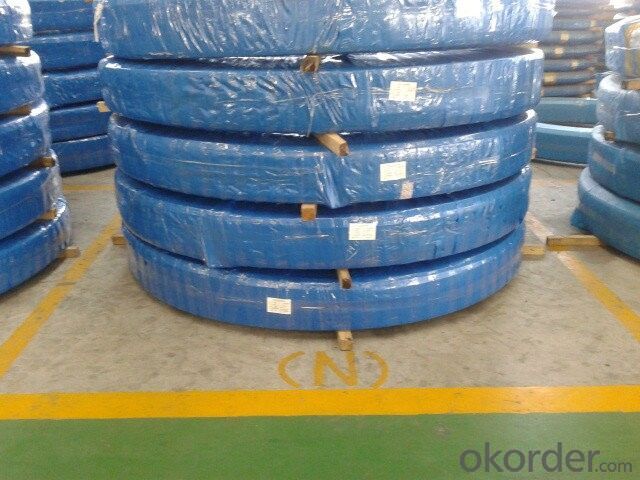
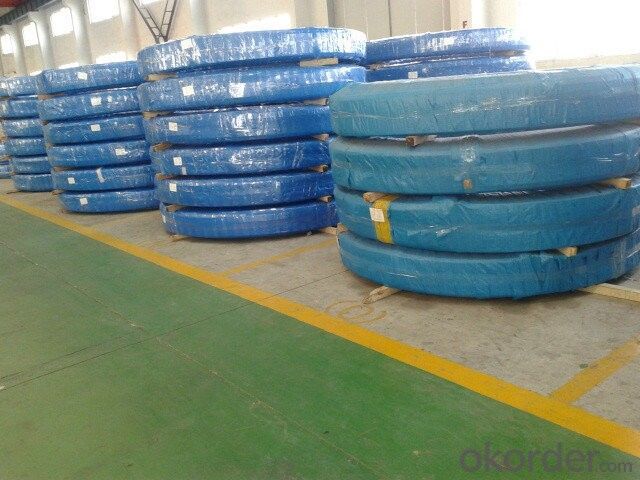
- Q: What are the challenges in manufacturing special steel?
- Some of the challenges in manufacturing special steel include the high cost of raw materials, the complex and precise production processes, ensuring consistent quality and performance, meeting specific customer requirements, and staying up-to-date with rapidly advancing technologies and industry standards. Additionally, the demand for customization and shorter lead times can also present challenges in terms of production planning and logistics.
- Q: Can special steel be used for medical applications?
- Yes, special steel can be used for medical applications. It is often used for surgical instruments, implants, and medical devices due to its high strength, corrosion resistance, and biocompatibility.
- Q: Can special steel be used in the production of precision instruments?
- Yes, special steel can be used in the production of precision instruments. Special steel alloys often possess enhanced strength, durability, and resistance to corrosion, making them suitable for manufacturing precision instruments that require high precision and performance standards.
- Q: What are the different methods of testing the quality of special steel?
- There are several methods used to test the quality of special steel. 1. Chemical Analysis: This method involves analyzing the composition of the steel to ensure it meets the required chemical specifications. It helps determine the presence and quantity of various elements, such as carbon, manganese, chromium, nickel, and others, which are crucial for achieving specific mechanical properties. 2. Mechanical Testing: Mechanical testing is performed to evaluate the strength, hardness, ductility, and other mechanical properties of special steel. Common tests include tensile testing, which measures the steel's resistance to breaking under tension, and hardness testing, which determines its resistance to indentation or scratching. 3. Non-Destructive Testing (NDT): NDT methods are employed to assess the quality of steel without causing damage. Techniques such as ultrasonic testing, magnetic particle testing, and liquid penetrant testing are used to detect surface and internal defects, cracks, or discontinuities that may affect the steel's integrity. 4. Microscopic Examination: Microscopy is used to examine the microstructure of special steel, allowing for the evaluation of grain size, inclusions, and other structural features. This analysis can provide insights into the steel's properties and potential defects. 5. Corrosion Testing: Special steel often needs to resist corrosion in harsh environments. Various corrosion tests, such as salt spray testing, electrochemical methods, and exposure to corrosive substances, are conducted to assess the steel's resistance to corrosion and determine its suitability for specific applications. 6. Impact Testing: This method involves subjecting the steel to a high-energy impact to assess its toughness and resistance to sudden loading. It helps determine if the steel can withstand sudden shocks or impacts without fracturing. 7. Heat Treatment Analysis: Special steel often undergoes heat treatment processes to enhance its properties. Heat treatment analysis involves examining the microstructure and hardness of the steel after the treatment to ensure it has achieved the desired properties. Overall, the combination of these testing methods helps ensure that special steel meets the required quality standards, ensuring its suitability for various applications, such as construction, automotive, aerospace, and industrial equipment.
- Q: What are the different heat treatment processes used in special steel production?
- Some of the different heat treatment processes used in special steel production include annealing, quenching, tempering, and normalizing. Annealing is a process of heating and slowly cooling the steel to relieve internal stresses and enhance its ductility. Quenching involves rapidly cooling the steel to increase its hardness and strength. Tempering is done after quenching to reduce brittleness and improve toughness. Normalizing is a heat treatment process that involves heating the steel to a specific temperature and then cooling it in still air to achieve a uniform structure. These processes are essential for achieving the desired mechanical properties and performance of special steel.
- Q: What is the impact of impurities on the properties of special steel?
- The presence of impurities in special steel can have significant impacts on its properties. Impurities can alter the steel's mechanical properties, such as strength, hardness, and toughness. They can also affect the steel's corrosion resistance and thermal conductivity. Additionally, impurities can lead to microstructural defects, such as grain boundaries or inclusions, which can further weaken the steel. Therefore, minimizing impurities is crucial in order to achieve high-quality special steel with desirable properties.
- Q: Can special steel be used for making aerospace components?
- Yes, special steel can be used for making aerospace components. Special steel, also known as aerospace steel or aircraft steel, is specifically designed to meet the high demands and stringent requirements of the aerospace industry. It possesses exceptional strength, durability, and heat resistance properties, which are crucial for withstanding the extreme conditions experienced by aircraft components during flight. Aerospace components, such as landing gear, engine parts, fasteners, and structural elements, often require materials that can maintain their integrity under high temperatures, stress, and corrosive environments. Special steel alloys are developed to have excellent mechanical properties, including high tensile strength, fracture toughness, and resistance to fatigue, creep, and corrosion. These properties make them suitable for critical aerospace applications where safety and reliability are of utmost importance. Furthermore, special steel can be tailored to specific requirements, such as weight reduction, improved fuel efficiency, and enhanced performance. Through advanced alloying techniques and heat treatments, aerospace steel can be engineered to have desirable characteristics like increased hardness, wear resistance, and dimensional stability. This allows for the production of lighter and more efficient aerospace components without compromising on strength or safety. In conclusion, special steel is a preferred material for making aerospace components due to its exceptional mechanical properties, heat resistance, and corrosion resistance. Its ability to withstand extreme conditions and be customized to specific requirements makes it an ideal choice for manufacturing critical parts used in the aerospace industry.
- Q: What are the common challenges in heat treatment of special steel?
- To achieve the desired material properties, careful attention must be given to several challenges encountered in the heat treatment of special steel. One primary challenge revolves around the necessity for meticulous temperature control throughout the heating and cooling stages. Special steels typically have specific temperature ranges for heat treatment that must be strictly adhered to in order to attain the desired microstructure and mechanical properties. Failing to maintain precise temperature control can result in inadequate or inconsistent heat treatment, ultimately leading to suboptimal material performance. Another challenge lies in the potential distortion or warping of the steel components during the heat treatment process. Special steels often possess intricate designs or complex shapes, making them more susceptible to distortion when subjected to high temperatures. This distortion can have adverse effects on the overall quality and dimensional accuracy of the final product. Consequently, careful consideration must be given to the selection of suitable heating and cooling methods, as well as the utilization of fixtures or jigs to minimize distortion. Moreover, special steels may contain alloying elements that significantly influence the heat treatment process. Elements like chromium, molybdenum, or vanadium can alter the steel's hardenability, tempering response, or transformation behavior. Their presence can introduce additional challenges when determining the optimal heat treatment parameters, necessitating adjustments to heating and cooling rates, soak times, or quenching media. Lastly, achieving uniformity in heat treatment across a batch of special steel components can prove to be challenging. Variations in size, shape, or composition within a batch can result in inconsistent heat treatment outcomes. Controlling the heating and cooling rates, ensuring proper circulation of the heat treatment media, and implementing effective process monitoring techniques are essential in achieving consistent and uniform material properties. In conclusion, the heat treatment of special steel encompasses challenges such as precise temperature control, distortion/warping, the influence of alloying elements, and achieving uniformity across a batch. Successfully addressing these challenges requires a comprehensive understanding of the steel's composition, meticulous process planning, and the utilization of appropriate process controls and monitoring techniques.
- Q: How does special steel perform in nuclear applications?
- Special steel performs exceptionally well in nuclear applications due to its unique properties. It has high strength, excellent corrosion resistance, and exceptional temperature resistance, making it ideal for containing and transporting radioactive materials. Special steel also maintains its structural integrity even under extreme conditions, such as high radiation levels and elevated temperatures, thus ensuring the safety and reliability of nuclear facilities. Additionally, its excellent weldability and formability allow for precise fabrication, enabling the construction of complex nuclear components. Overall, special steel plays a crucial role in enhancing the efficiency, durability, and safety of nuclear applications.
- Q: What are the requirements for special steel used in defense equipment manufacturing?
- The requirements for special steel used in defense equipment manufacturing typically include high strength and durability, resistance to corrosion and wear, good toughness and impact resistance, as well as the ability to withstand extreme temperatures and harsh environments. Additionally, the steel must meet stringent quality control standards and industry specifications to ensure its reliability and performance in critical defense applications.
Send your message to us
OIL TEMPERED SPRING STEEL WIRE
- Loading Port:
- China Main Port
- Payment Terms:
- TT OR LC
- Min Order Qty:
- -
- Supply Capability:
- -
OKorder Service Pledge
OKorder Financial Service
Similar products
Hot products
Hot Searches
Related keywords
